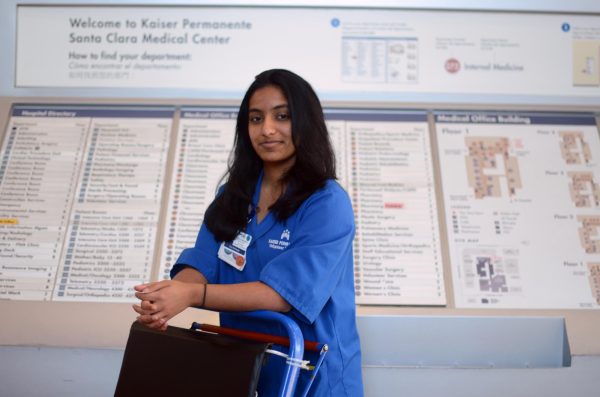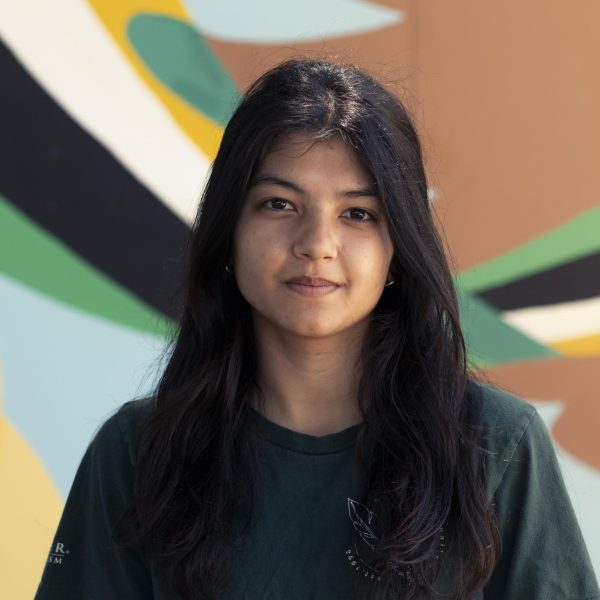
Amidst the tumult of health care routines at Kaiser Permanente, a moment of tranquility unfolds as Diya Mukherjee (12) stands beside an elderly patient. She attentively guides him through the final steps of his hospital journey. As she wheels him out of the hospital, the weight of illness gradually lifts, replaced by a tangible sense of gratitude emanating from the patient. In this simple act of discharge, she embodies the spirit of her volunteerism, illuminating the immeasurable impact of empathy in the healthcare experience.
Driven by her natural sense of compassion, Diya’s reassuring presence ensures the support of each patient as they navigate their healthcare journey. Throughout her two-year tenure as a volunteer at Kaiser, Diya consistently demonstrates her commitment to making a difference in the lives of the patients whether she’s completing administrative tasks or offering emotional support during difficult times, with each interaction making a meaningful impact on the hospital community.
“It’s gratifying knowing that I’m helping people, especially when I see that they’re struggling,” Diya said. “People have their conditions that they have to live with, and if I can help with that, then I will. There’s a lot of people who are scared to ask for help, so volunteering gave me that experience of being the one to reach out to them and offer that help.”
Her drive to volunteer stems from her ambition to pursue a career in medicine. Immersing herself in a hospital environment and gaining firsthand experience in patient care has primed her for her future aspirations. She’s witnessed both the successes and setbacks of healthcare at Kaiser, exposing her to the benefits and tradeoffs in healthcare.
“She certainly has a very strong interest in medicine,” upper school Biology teacher Matthew Harley said. “She’s definitely one of a handful of students that I see every year, but she’s absolutely memorable for how much she enjoyed certain aspects of biology. She just lights up when she hears an antidote or a biological situation and is so visibly impressed and passionate about what she’s learning.”
In a tight-knit team of six volunteers in her shift, they collaborate to organize tasks and divide responsibilities. Apart from assisting visitors and patients around the hospital, they take moments of down-time to bond with each other. Especially through their mutual interest in medicine, Diya not only cultivates lasting relationships with other volunteers but also gleans invaluable advice from those with more experience than her.
“A lot of the other volunteers are college students, so I listen to them about what they learned from college or just life lessons,” Diya said. “I’ve met a lot of people there who I consider older siblings. There’s a lot of people that I keep in touch with, even if they’ve left or come back occasionally.”
Regardless of the environment she’s in, Diya’s sociable nature radiates, making her approachable and eager to connect with new people. Close friend Saahil Kajarekar (12) affirms her outgoing demeanor and positive attitude, particularly during challenging moments.
“Diya’s very social and gets along with most people, so it’s easy for her to become close with new people she meets,” Saahil said. “She’s very confident in terms of talking to people and a positive person to the whole friend group. Especially for college applications, she helps us to not worry too much about the whole process.”
Diya attributes her confidence in conversing with people to her involvement in volunteering. Initially hesitant to interact with unfamiliar people, particularly in environments like hospitals where proactive outreach is essential, she now approaches such interactions with self-assurance, extending this attitude even beyond professional settings.
“When I started out, I was more hesitant to talk to people who are strangers, especially since a lot of the time at Kaiser, people don’t come up to you and ask you for help. You have to be the one to approach them and ask if they need help. Now I’m more confident in talking to people because I’ve been through so many of these situations.”
Her confidence in speaking extends to her involvement in Public Forum, where she’s compelled to step forward and assert her viewpoints regarding technical or world events. She began speech and debate in middle school and fully embraced competitive public forum in high school, drawn to its collaborative nature.
As second speaker, Diya’s responsibility is not to make her team’s case, but to counter the arguments presented by the opponents, preparing for both the pro and con side. She notes that her engagement in Public Forum exposed her to global events, reshaping her outlook on politics and broadening her perspective.
“I’ve learned that there’s always a counterpoint to everything,” Diya said. “Every single point you can make, no matter how true it is, there’s always something that you’re missing or not thinking about. I’ve been forced to constantly think ‘If you have a perspective, what are its flaws or its downsides?’ You can always try to find something that’s misleading, which has changed the way I think about politics or my personal political opinions.”
As Diya’s public forum partner since junior year, close friend Mariana Ryder (12) and her formed a strong partnership due to their respective strengths and weaknesses complementing each other. She praises Diya’s ability to quickly analyze and synthesize information, allowing her to navigate nuanced discussions.
“Diya’s really talented at public forum because of her ability to make logical arguments and extend her thinking without needing to research,” Mariana said. “She’s also able to understand advanced topics very quickly and also see the connections between what we’re debating and historical context. This is really necessary, not only for her as a second speaker and being able to make rebuttal arguments, but also understanding the round in general.”
Diya’s experiences in both volunteering and debate not only refined her personal skills but also served as catalyst for self-discovery. Her willingness to reevaluate her goals, fueled by both personal ambition and a sense of social responsibility, prompted a transformative shift in her aspirations.
“Something I’ve learned about myself through debate and at Kaiser the most is that I’m a very people-oriented person,” Diya said. “For most of my life, I thought I wanted to do only medicine, but now I’ve changed my goals so I still want to do medicine and in the long-term do public health or something more policy-related. They’ve shifted what my future looks like.”


















![“[Building nerf blasters] became this outlet of creativity for me that hasn't been matched by anything else. The process [of] making a build complete to your desire is such a painstakingly difficult process, but I've had to learn from [the skills needed from] soldering to proper painting. There's so many different options for everything, if you think about it, it exists. The best part is [that] if it doesn't exist, you can build it yourself," Ishaan Parate said.](https://harkeraquila.com/wp-content/uploads/2022/08/DSC_8149-900x604.jpg)




![“When I came into high school, I was ready to be a follower. But DECA was a game changer for me. It helped me overcome my fear of public speaking, and it's played such a major role in who I've become today. To be able to successfully lead a chapter of 150 students, an officer team and be one of the upperclassmen I once really admired is something I'm [really] proud of,” Anvitha Tummala ('21) said.](https://harkeraquila.com/wp-content/uploads/2021/07/Screen-Shot-2021-07-25-at-9.50.05-AM-900x594.png)







![“I think getting up in the morning and having a sense of purpose [is exciting]. I think without a certain amount of drive, life is kind of obsolete and mundane, and I think having that every single day is what makes each day unique and kind of makes life exciting,” Neymika Jain (12) said.](https://harkeraquila.com/wp-content/uploads/2017/06/Screen-Shot-2017-06-03-at-4.54.16-PM.png)








![“My slogan is ‘slow feet, don’t eat, and I’m hungry.’ You need to run fast to get where you are–you aren't going to get those championships if you aren't fast,” Angel Cervantes (12) said. “I want to do well in school on my tests and in track and win championships for my team. I live by that, [and] I can do that anywhere: in the classroom or on the field.”](https://harkeraquila.com/wp-content/uploads/2018/06/DSC5146-900x601.jpg)
![“[Volleyball has] taught me how to fall correctly, and another thing it taught is that you don’t have to be the best at something to be good at it. If you just hit the ball in a smart way, then it still scores points and you’re good at it. You could be a background player and still make a much bigger impact on the team than you would think,” Anya Gert (’20) said.](https://harkeraquila.com/wp-content/uploads/2020/06/AnnaGert_JinTuan_HoHPhotoEdited-600x900.jpeg)

![“I'm not nearly there yet, but [my confidence has] definitely been getting better since I was pretty shy and timid coming into Harker my freshman year. I know that there's a lot of people that are really confident in what they do, and I really admire them. Everyone's so driven and that has really pushed me to kind of try to find my own place in high school and be more confident,” Alyssa Huang (’20) said.](https://harkeraquila.com/wp-content/uploads/2020/06/AlyssaHuang_EmilyChen_HoHPhoto-900x749.jpeg)



